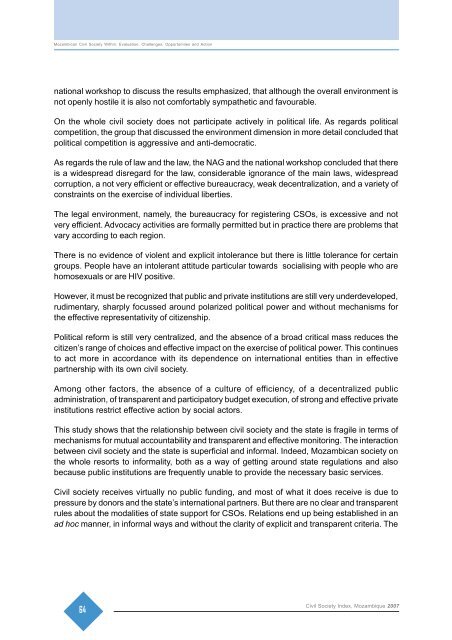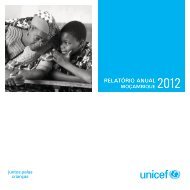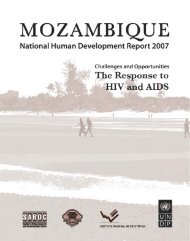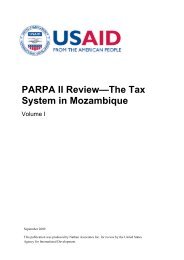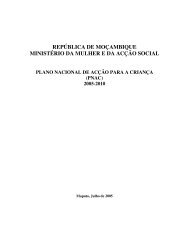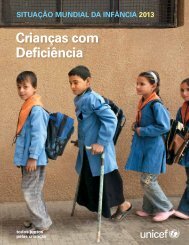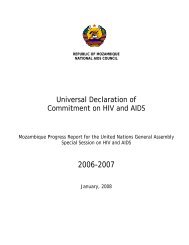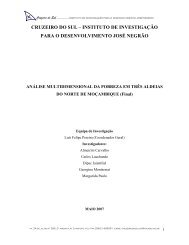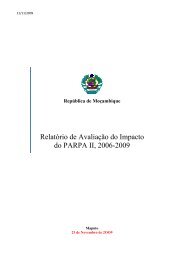Mozambican Civil Society Within: - UNICEF Mozambique - Home page
Mozambican Civil Society Within: - UNICEF Mozambique - Home page
Mozambican Civil Society Within: - UNICEF Mozambique - Home page
You also want an ePaper? Increase the reach of your titles
YUMPU automatically turns print PDFs into web optimized ePapers that Google loves.
<strong>Mozambican</strong> <strong>Civil</strong> <strong>Society</strong> <strong>Within</strong>: Evaluation, Challenges, Opportunities and Action<br />
national workshop to discuss the results emphasized, that although the overall environment is<br />
not openly hostile it is also not comfortably sympathetic and favourable.<br />
On the whole civil society does not participate actively in political life. As regards political<br />
competition, the group that discussed the environment dimension in more detail concluded that<br />
political competition is aggressive and anti-democratic.<br />
As regards the rule of law and the law, the NAG and the national workshop concluded that there<br />
is a widespread disregard for the law, considerable ignorance of the main laws, widespread<br />
corruption, a not very efficient or effective bureaucracy, weak decentralization, and a variety of<br />
constraints on the exercise of individual liberties.<br />
The legal environment, namely, the bureaucracy for registering CSOs, is excessive and not<br />
very efficient. Advocacy activities are formally permitted but in practice there are problems that<br />
vary according to each region.<br />
There is no evidence of violent and explicit intolerance but there is little tolerance for certain<br />
groups. People have an intolerant attitude particular towards socialising with people who are<br />
homosexuals or are HIV positive.<br />
However, it must be recognized that public and private institutions are still very underdeveloped,<br />
rudimentary, sharply focussed around polarized political power and without mechanisms for<br />
the effective representativity of citizenship.<br />
Political reform is still very centralized, and the absence of a broad critical mass reduces the<br />
citizen’s range of choices and effective impact on the exercise of political power. This continues<br />
to act more in accordance with its dependence on international entities than in effective<br />
partnership with its own civil society.<br />
Among other factors, the absence of a culture of efficiency, of a decentralized public<br />
administration, of transparent and participatory budget execution, of strong and effective private<br />
institutions restrict effective action by social actors.<br />
This study shows that the relationship between civil society and the state is fragile in terms of<br />
mechanisms for mutual accountability and transparent and effective monitoring. The interaction<br />
between civil society and the state is superficial and informal. Indeed, <strong>Mozambican</strong> society on<br />
the whole resorts to informality, both as a way of getting around state regulations and also<br />
because public institutions are frequently unable to provide the necessary basic services.<br />
<strong>Civil</strong> society receives virtually no public funding, and most of what it does receive is due to<br />
pressure by donors and the state’s international partners. But there are no clear and transparent<br />
rules about the modalities of state support for CSOs. Relations end up being established in an<br />
ad hoc manner, in informal ways and without the clarity of explicit and transparent criteria. The<br />
64<br />
<strong>Civil</strong> <strong>Society</strong> Index, <strong>Mozambique</strong> 2007


